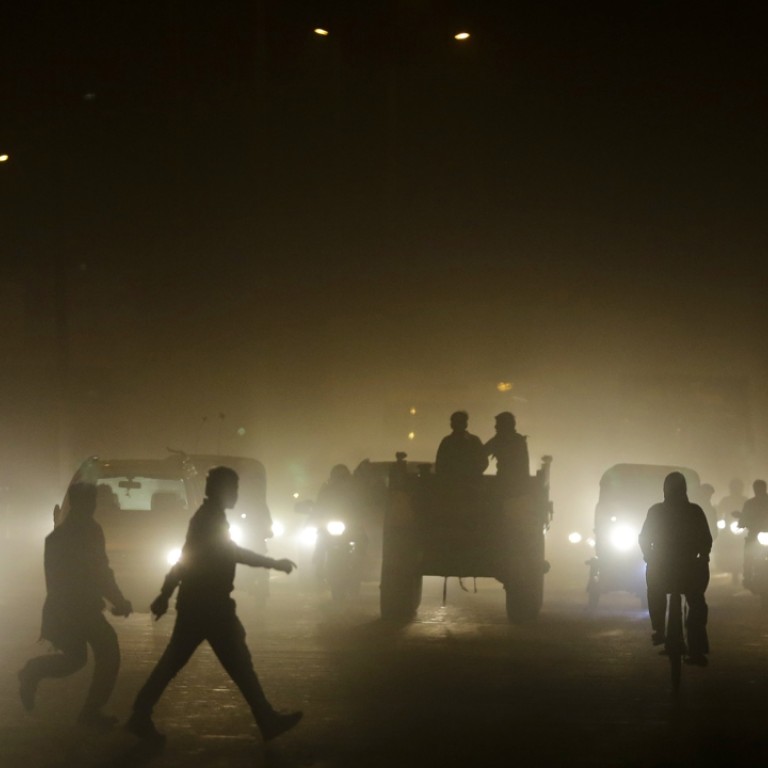
Airpocalypse: expats flee New Delhi, where smog is even worse than Beijing’s
Why take years off your life by sucking in cancer-causing smog particles with every breath? That’s the question many foreigners living in India’s capital have asked, and their answer is to leave
Dhyan Summers, a Californian, used to enjoy her job in New Delhi. An expat, she counselled fellow expatriates on how to deal with the city’s poverty, dirt, beggars, and cultural differences. Working from her home in Nizamuddin East, a quiet, tree-lined neighbourhood popular with foreigners, she built up a solid clientele, often advising grumbling expats that “what you can’t change about India, you must accept”.
She ended up rejecting her own advice. In September, the pollution levels soared so high that Summers decided she could not accept this aspect of the city and packed up, returning home to the west coast US state of Oregon.
The pollution was so bad this year. I felt restricted about being outdoors, and even indoors it wasn’t much better.
“I knew I would be taking years off my life if I stayed. The pollution was so bad this year. I felt restricted about being outdoors, and even indoors it wasn’t much better. I decided to leave but continue with online counselling from Oregon City,” says Summers.
Her counselling sessions with Delhi expats reveal that many, particularly those with young children, are very concerned about the pollution. “Many embassy personnel, many multinational employees want to return to their home countries due to the pollution,” she says.
Many already have. When Summers left on September 1, she was merely joining an expat exodus that was already under way, prompted by the choking smog that by then had engulfed the Indian capital for more than a year.
Levels of particulate matter – the minute, carcinogenic particles that penetrate the lungs – soared. The World Health Organisation last year declared New Delhi to be the most polluted city in the world, ahead of Beijing. In September, the World Bank reported the air pollution in New Delhi was almost three times higher than that in Beijing.

Since the government does not keep track of foreigners who leave the country, the evidence for the expat exodus is anecdotal, but it is strong. You hear couples talking at parties and dinners about how they are getting ready to leave and of the friends who already have.
The four months of winter used to be when you could spend time outdoors, but now you can’t do that because the air is toxic.
British photographer Simon de Trey-White is leaving in March. For the past 18 months, he has been wearing a face mask each time he goes out. “In my social circle alone, a dozen journalists have left. When I leave in March, I will be among the last to shut the door,” he says.
At some point this summer, he decided the professional satisfaction he derived from working in India was no compensation for the poor quality of life.
‘’For eight months of the year, the summer heat keeps you indoors. The four months of winter used to be when you could spend time outdoors, but now you can’t do that because the air is toxic. So you are trapped indoors all year round,” he says.

I am here for work and for love. I know the pollution is harmful. It has been terrible this year but I cannot leave
The exodus began last summer after Gardiner Harris, The New York Times correspondent, wrote in an article that his young son’s respiratory distress had forced him and his wife to leave New Delhi. It prompted many to wonder what on Earth they were still doing here.
Not everyone can leave, though; they may lack the resources to do so or are too rooted in the city by work or relationships.
“I am here for work and for love. I know the pollution is harmful. It has been terrible this year but I cannot leave because of the relationship I am in,” says Italian Nadia Bonfina, head of marketing and sales for the LÓpera patisserie chain.
Some who stay try to alleviate the stress by becoming active in efforts to control air pollution. Some have set up neighbourhood groups to do their bit – urging people not to burn leaves and giving security guards heaters to keep warm in the winter cold rather than burning wood. Others hold workshops in schools to ensure that children are more aware.


